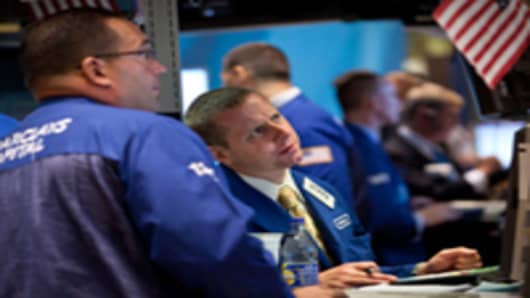The witching hour that could determine whether Greece defaults or not is Thursday afternoon, and that will hang over markets until it's known whether enough private investors accept a debt restructuring deal.
Private sector investors have until 3 p.m. Eastern time to decide on participation in the Greek debt relief deal, and if fewer than 75 percent agree, the country could head towards a default that ultimately could trigger credit default swaps.
How much that would roil markets is up for debate. Some traders think the repercussions would be substantial. "It's hard to tell. You just don't know if someone's in trouble. It doesn't appear so, but you don't want to be too complacent," said Alan Ruskin, head of G10 currency strategy at Deutsche Bank.
Thursday's top economic headline is the weekly jobless claims report, expected to come in at about the same 350,000 level as last week. The Bank of England and European Central Bank also meet ahead of the U.S. opening bell and are not expected to make any moves.
"It's all Greece. Everybody is waiting for the headline to see if the worst case scenario is off the table," said Daniel Greenhaus, global market strategist with BTIG. "The 10 percent chance it doesn’t work out is a huge hit to the market."
Stocks Wednesday rebounded after Tuesday's sharp selloff, as ADP payroll numbers showed 216,000 private sector jobs added in February. The number is a sort of preview of the Friday government jobs report but it is not really an accurate indicator. Still, a positive 200,000 plus number was encouraging to markets.
There were also positive signs of movement by the Greek investors. But the big positive for risk markets Wednesday was a Wall Street Journal article that opened the door for another round of Fed easing. The Dow rose 78 to 12,837, and the S&P 500 was up 9 at 1,352.
The Journal story comes just a week after Fed Chairman Ben Bernanke disappointed markets by suggesting the Fed may not embark on another round of quantitative easing . The article said the Fed is considering a new type of program, where it could buy long term mortgages or Treasury bonds but tie up the money by borrowing it back for short periods at low rates.
The quantitative easing program, or QE3, the Fed has discussed works differently. The Fed would have once more added to its balance sheet with the purchases of securities — this time mortgage securities — in an effort to hold down rates. The Fed is currently conducting a separate program, "operation twist," under which it buys long dated bonds and sells shorter term Treasurys in the same amount. That program ends in June.
"It was the Fed story that was the big excitement of the day," said Greenhaus. "Clearly, I think the view taking hold in markets was that the Fed was going to do less easing because the economy was getting better. But this is a Fed bent on leaning into the wind."
J.P. Morgan economist Michael Feroli said he still does not expect the Fed to carry out more easing. "I think this kind of speaks for itself. I don't think it changes anything in terms of the likelihood of doing QE... I don't think this tells us anything." He said it is normal for the Fed to discuss its options.
There are several earnings reports Thursday including Canadian Imperial Bank; Canadian Natural Resources and Smithfield Foods. Cooper Cos and Aeropostale report after the bell. Exxon Mobil holds its analysts' meeting at 9 a.m.
Follow Patti Domm on Twitter: @pattidomm
Questions? Comments? Email us at marketinsider@cnbc.com



